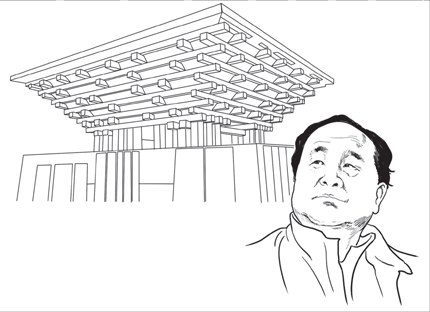
English>>Life & Culture
China's culture once influenced the world, and it can again
(Shanghai Daily)
08:37, December 04, 2012 


 |
| (Shanghai Daily/Illustration by Zhou Tao) |
Upon his return he published his "Travels," in which he wrote admiringly of the great wealth and wisdom of China, images that captured the Western imagination.
In the 16th century Jesuit missionaries came to China, the most famous of whom was Matteo Ricci (1552-1610), known in Chinese as Li Matou.
Confucianism extolled
The Jesuits were active agents of transmission of culture and science between China and the West; in their writings the Jesuits extolled the great virtues of Chinese philosophy, especially Confucianism.
Their works were read by early philosophers of the European Enlightenment, notably the Germans Gottfried Wilhelm Leibniz (1646-1716) and Christian Wolff (1679-1754). They in turn had a significant influence on the great Immanuel Kant (1724-1804).
In developing his natural philosophy, Kant drew considerable inspiration from Taoism and Confucianism, as transmitted by the Jesuits and then to the philosophers. Ultimately Chinese cultural and philosophical influence spread across much of the Enlightenment, including the French Voltaire (1694-1778).
Although China was remote physically and had virtually no contact with the West, it loomed large as a major cultural force in European thought and especially in its influence on the Enlightenment.
On the artistic front, from the Renaissance until the late 18th century China had a significant influence encapsulated in the generic term Chinoiseries.
This was especially the case in ceramics, both in attempts to copy Chinese styles and in the importation of Chinese works to adorn the salons of palaces.
Subsequently Chinese-style gardens with pagodas came into fashion. Among the richest examples of Chinoiseries can be found in the Schonbrunn Palace, the residence of the Hapsburg monarchs outside Vienna, which flourished especially during the great reign of the Empress Maria Theresa (1717-1780).
Throughout these centuries while China was a great cultural power, it was also the world's leading economic power, accounting for 30 percent or more of global GDP.
Everything changed
Then in the early 19th century, with the industrial revolution and the rise of Western global supremacy, everything changed.
China was initially still perceived as wealthy and a great market - illustrated in the 1850s slogan: "if every Chinaman adds four inches to his shirt-tails, Lancashire mills will be kept busy for generations" - but its civilization came to be derided; the sacking of the Summer Palace by French and British troops in 1860, during the Second Opium War, ranks among the most perfidious acts of cultural vandalism.
From then came a steep decline in numerous respects, economically, politically and culturally. Western writing on China was almost invariably derisive. There were some exceptions, for example the French poet and author Victor Hugo (1802-1885), who bewailed the sacking of the Summer Palace. But this was exceptional.
In the course of the 20th century, China's image was reflected especially in two stereotypes in the West: on the one hand that of "evil" incarnate, for example, in the series of novels (also put into film) of the character Fu Manchu by British author Sax Rohmer (1883-1959); on the other as a pitiful victim of poverty, most famously represented in the novel by Pearl Buck (1892-1973) "The Good Earth."
With the Liberation (in 1949), China regained sovereignty and dignity, and following the reforms unleashed in the late 1970s it has emerged as a daunting global economic superpower, second only to the United States and expected to become number one within less than a decade.
In that sense, China is resuming its former position as economic powerhouse.

